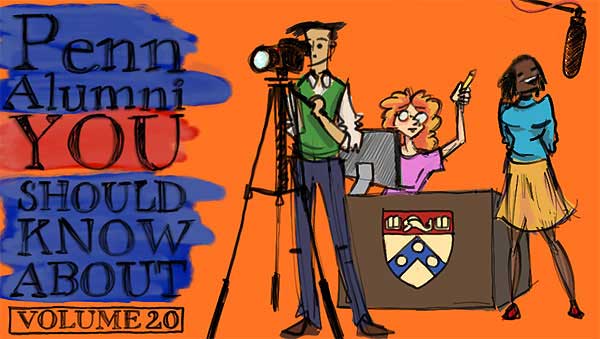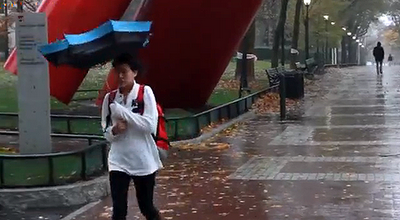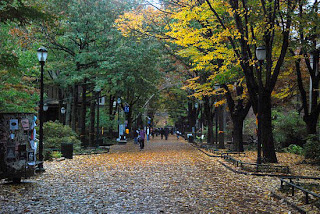What Faye Dunaway told this Penn undergrad at the Cannes Film Festival
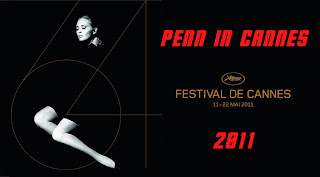
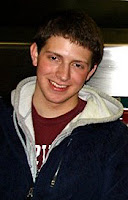 Over the past three years (2008 coverage and 2009 coverage and 2010 coverage) DT has given you an insider’s look at the films and politics of the Cannes Film festival from the perspective of our Penn in Cannes program correspondents.
Over the past three years (2008 coverage and 2009 coverage and 2010 coverage) DT has given you an insider’s look at the films and politics of the Cannes Film festival from the perspective of our Penn in Cannes program correspondents.
This year DT correspondent Jonah Stern (C’13) recently returned from the 2011 Cannes film festival with coverage of this year’s winner and loser films plus more! A local Philadelphian, Jonah aspires to one day enter the film industry and, hopefully, become a very successful filmmaker.
After the jump check out Jonah’s coverage on:
- difficulty getting into movie screenings
- the good films
- some (highly marketed) big films to avoid
- hobnobbing with celebrities and what Faye Dunaway said to Jonah(!)
- advice from 4 Penn Hollywood alumni about the business
The Penn Summer Abroad Program in Cannes was a fantastic experience. As an aspiring filmmaker and an avid lover of movies, this trip exposed me to both the newest innovations of independent film and influential members of the industry.
1) Difficulty getting into the movie screenings
“Since we were lowly, insignificant college students with no weight in the industry, we started off the festival with the low-ranking Cinephile badges that essentially left us last in line for any screening, so if enough filmmakers, press people, or potential buyers wanted to see the same screening and there were not enough seats left in the theater, we were left out cold.
For main competition films, which all premiered in the main theater, the Lumiere, we had to beg for tickets, or invitations, in order to get in. People who worked on the films or people with higher-ranking badges who reserved tickets often had more tickets than they needed, so if we stood outside the main theater holding signs that read “Une invitation s’il vous plait” for long, we had a chance of getting tickets. Some people were more successful in this venture than others. Girls generally had better luck, while guys almost always had no luck. I, for example, got almost all of my tickets through female friends on the trip who managed to get enough tickets for larger groups of us.
About halfway through the festival, once most of the important people had left after doing their business transactions, we magically received black badges, which are the badges given to short filmmakers and other lower-ranking professionals (with little or no money to contribute to the economy of the festival). With the black badges, we gained access to the Palais without needing a ticket to a screening within the next hour. This was a great improvement because it gave us access to many smaller, market screenings, free food and drinks, and the countless kiosks that littered the ground floor and basement, representing production companies from all over the world.”
2) The “Good” films:
“My favorite [and in my opinion the best] movies from the festival included We Need to Talk About Kevin, The Skin I Live In, Melancholia, Drive, and Footnote. These movies will also almost all, if not all, definitely make it to theaters in the United States since none are too graphic, they all have tremendous commercial appeal, and almost all of them have big-name stars.
- We Need to Talk About Kevin (Lynne Ramsay) illustrates the painful relationship a mother (Tilda Swinton) has with her disturbed son, Kevin (Ezra Miller), after he has committed an atrocious crime.
- The Skin I Live In (Pedro Almodovar) tells the story of a scientist (Antonio Banderas) dealing with the loss of his wife and daughter through his own unconventional scientific endeavors.
- Melancholia (Lars von Trier) describes, through grandly extended metaphors, the depression of a bride (Kirsten Dunst) on her wedding night and how it affects those close to her.
- Drive (Nicolas Refn) is about a lonely Hollywood stunt driver (Ryan Gosling) who gets involved in the underground crime world in order to protect a woman (Carey Mulligan) he loves.
- Lastly, Footnote (Joseph Cedar) describes the troubled relationship between an unsuccessful father (Shlomo Bar Aba) and his successful son (Lior Ashkenazi), who both work in the same academic field.”
3) The “Bad” films:
“There were also plenty of bad movies at the festival, some of which made me wonder how they even got in. Like the good movies, the bad movies spanned from the main competition to the out-of-competition, less mainstream screenings.
My least favorite films [and the films I thought were qualitatively the worst] included The Tree of Life, Lebanon, Pa., Sleeping Beauty, Hanezu, and Play.
- The Tree of Life (Terrence Malick) is a series of flashbacks of a middle aged man (Sean Penn) remembering his adolescence (Hunter McCracken), relationships with family members, and dealing with the loss of a loved one. These flashbacks are intercut with videos of galactic formations (or the Big Bang slash creation), natural scenery, and, well, dinosaurs. This film emitted an air of self-importance, but left me both bored and unsatisfied with the stories, the acting, the visuals, and most importantly any substantive message they very clearly tried to communicate.
- Lebanon, Pa. (Ben Hickernell) tells the story of a Philadelphia businessman (Josh Hopkins) dealing with the death of his distant father by traveling to his home out in the rural town of Lebanon, Pennsylvania. Lebanon was a good attempt at a “dramedy,” but it ultimately failed due to unconvincing acting, weak writing, and mediocre filmmaking in general.
- Sleeping Beauty (Julia Leigh) shows the spiraling degradation of a young university student (Emily Browning) as she commits herself to a job as a “sleeping beauty.” This film like The Tree of Life emitted an air of self-importance, but left me both bored and unsatisfied with the stories, the acting, the visuals, and most importantly any substantive message they very clearly tried to communicate.
- Hanezu (Naomi Kawase) describes the love between a man and woman living In the Asuka region of Japan, and how their relationship relates to an ancient Japanese poem of the region. Too slow and boring.
- Finally, Play (Ruben Ostlund) illustrates the societal and cultural relationships between white middle-class Swedes and lower-class African immigrants through the interactions of children “playing.” Too slow and boring.”
4) Hobnobbing with Celebrities
“While watching movies was the primary reason we went to the festival, we also met some very interesting or important people in the industry and attended a lot of really cool events.
Every day, two older movies, labeled “Cannes Classics,” were screened at the festival. I ended up going to two Cannes Classics, both of which I slept through. However, the amazing part of these screenings was that the directors and/or stars of the films were present, and the theaters were pretty cozy and intimate.
- The first screening I went to was a movie by Jerry Schatzberg that starred Faye Dunaway, who also happened to be the face of the festival this year. My friend and I did not know that she would be at the screening so we were pleasantly surprised to turn around in our back-row seats and see the star of Chinatown
and Network
standing directly behind us next to the director. If this wasn’t cool enough, the sound on the video kept malfunctioning once the movie was screened (after she and the director gave speeches). Faye and the director both ran in and out of the theater furiously, trying to figure out was wrong with the sound, and trying to fix it. In the process, she ended up standing directly behind me and my friend. My friend had asked for an autograph and when I asked she called me “darling” and gently told me not to “take advantage of the situation” because “we’re all upset” that the film was malfunctioning. . Needless to say, once the movie actually started, I passed out immediately and woke up near the end.
- The other Cannes Classic I went to was Robert De Niro’s A Bronx Tale
. Even though this movie is not very old and few would consider it to be an actual classic, De Niro was the president of the jury this year for the festival, and this was the first movie he directed—he also starred in it. Unlike Faye’s movie’s screening, which was casual and not hectic at all, there was a massive line for A Bronx Tale
and we ended up waiting in the rain for about an hour. Still, it was worth it. Once we got inside and sat down, Robert De Niro (accompanied by his entourage that included Jude Law and at least ten body guards) came into the theater, walked right by, sat down across the aisle from us, and gave a speech with the president of the festival about the Tribeca Film Festival, which he co-founded. Even though he didn’t stay for the screening (during which I fell asleep again), it was amazing to see him in person and hear him speak. As one of my all-time favorite actors who has starred in many of my all-time favorite films (especially those directed by Martin Scorsese), it was unreal to be in such close physical proximity to the legend himself.”
5) Meeting with Hollywood Penn alumni
“Four Penn alumni or parents of Penn alumni who are big names in the movie business spoke to our group privately. While none of these people are movie stars or directors, they all hold a lot of weight in their respective positions and we learned of some really interesting inside information by speaking to them. The speakers included:
- Billy Goldberg (C’09), a Penn alum who works for the Tribeca Film Festival, and Lorraine Carrady Quinn (C’73), who heads Caribbean Cinemas —the top movie theater company in the Caribbean—with her brother. These two speakers offered extremely interesting insights into the distribution and presentation of films.
Billy Goldberg (C’09) told us about getting a job in the film industry after graduating from Penn. He told us how he got in and how his experience at the Cannes Film Festival with Penn significantly contributed to this process for him. He also told us about the Tribeca distribution company that he works for (a new manifestation of the popular film festival) and how, since they are much smaller and don’t have resources to get movies in theaters and do massive ad campaigns, many smaller movies are more frequently being released as video-on-demand via cable services.
Lorraine Carrady Quinn (C’73) told us about the business of creating a unique, engaging and attractive theater experience that is differentiated from watching the same movies at home. She also talked to us about subtitling films in multiple languages (for the many diverse nations in the Caribbean), marketing different genres of films to different markets and what has been successful from her business experience and how this extends to broader scenarios.

- Rick Hess (C’84)-head of Creative Artists Agency Film Finance Group gave us an inside scoop on elements of the creative process paired with the business tactics used in the film industry. He and his wife told us about the development of Terrence Malick’s “The Tree of Life”, one of the most hyped-up films of the festival (which I did not particularly like). He described his own relationship with “Terry” and how Malick communicated to him his intentions with the film. This was amazing to hear. We basically got to have an indirect, private conversation with the director (via Rick Hess) about the film.

- Jeff Berg (Penn parent) -Chairman and CEO of International Creative Management (ICM), explained to us about the difference between agencies and management firms in Hollywood. He told us about the process he goes through when he is given screenplays to read, and communicating appropriate roles to the actors and filmmakers he represents, which include Al Pacino, Jodie Foster, Woody Allen, and Roman Polanski, among many other big names. One of the most interesting stories he told us was how he single-handedly convinced the president of the festival to watch and allow in the Israeli film “Footnote” —one of my favorite movies from the festival—which ended up winning the prize for Best Screenplay.”
Talking to these influential figures in the movie industry made the prospect of someday breaking into and working in the industry seem more realistic and comprehensible. The knowledge and advice they shared with us was invaluable and, most importantly, the connections we made with them may aid us in our future ventures to find internships or jobs in the movie business.
The experience of attending the most famous and prestigious film festival in the world, even if we were often treated like scum by the French guards, was an extraordinary experience. It was surreal. Seeing so many strange, explicit, edgy and innovative films from all over the world not expanded my views of cinema, but also reinforced my desire to make movies. I would say the most valuable lesson I took away from this trip was that, as magical and unreachable as the film industry seems at times (at least to me), it’s very much a real professional prospect and it is possible, though difficult, to break into the industry and make a career of cinema.












